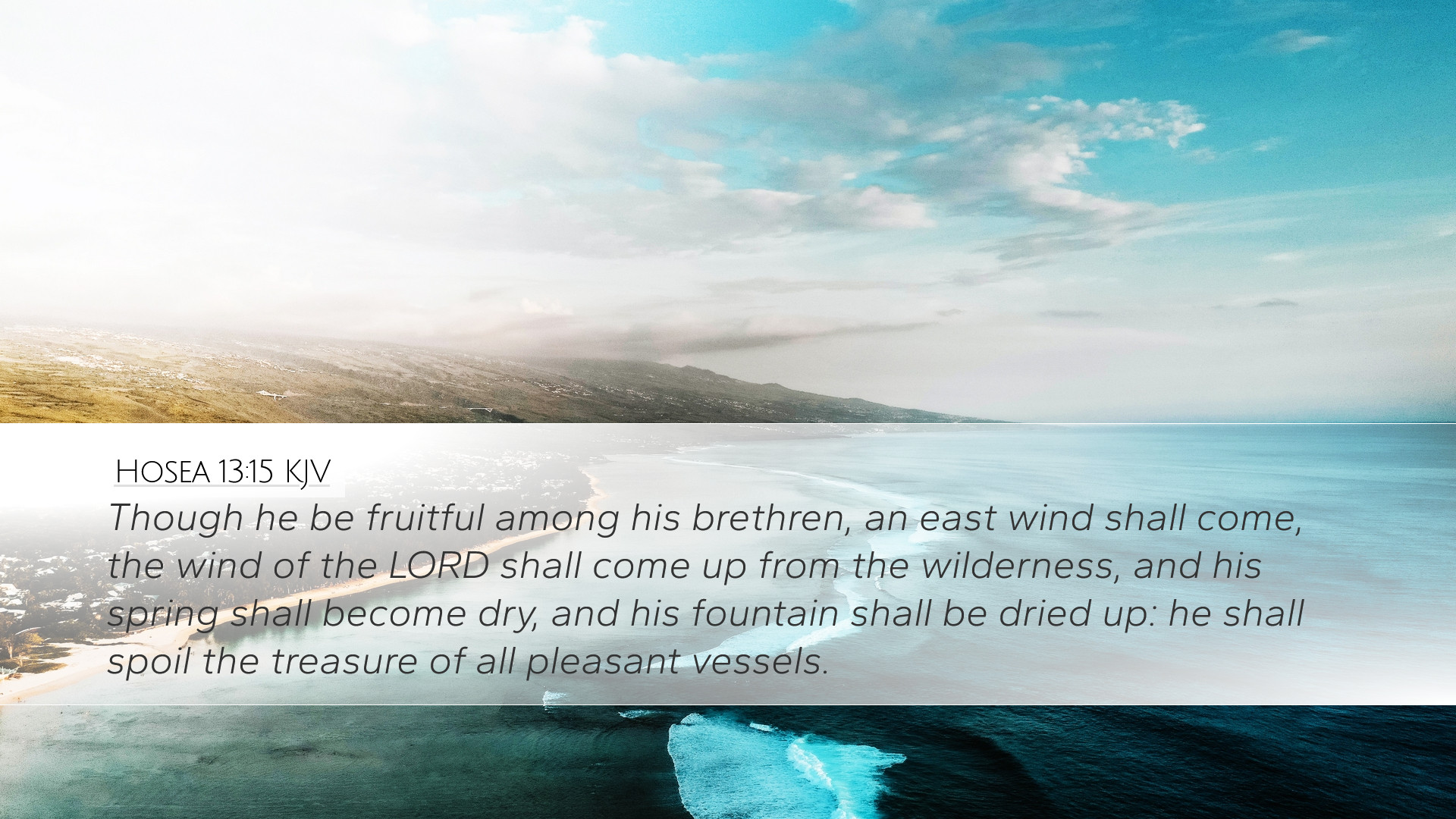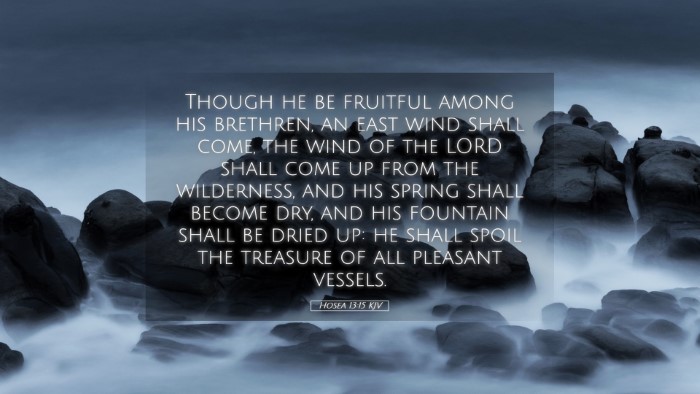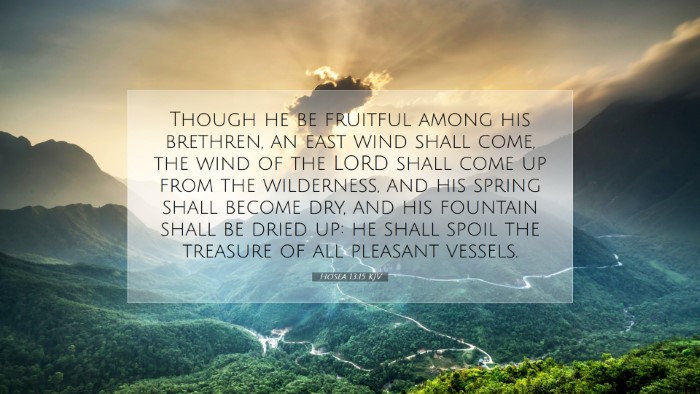Old Testament
Genesis Exodus Leviticus Numbers Deuteronomy Joshua Judges Ruth 1 Samuel 2 Samuel 1 Kings 2 Kings 1 Chronicles 2 Chronicles Ezra Nehemiah Esther Job Psalms Proverbs Ecclesiastes Song of Solomon Isaiah Jeremiah Lamentations Ezekiel Daniel Hosea Joel Amos Obadiah Jonah Micah Nahum Habakkuk Zephaniah Haggai Zechariah MalachiHosea 13:15
Hosea 13:15 KJV
Though he be fruitful among his brethren, an east wind shall come, the wind of the LORD shall come up from the wilderness, and his spring shall become dry, and his fountain shall be dried up: he shall spoil the treasure of all pleasant vessels.
Hosea 13:15 Bible Commentary
Commentary on Hosea 13:15
Bible Verse: "Though he be fruitful among his brethren, an east wind shall come, the wind of the Lord shall come up from the wilderness, and his spring shall become dry, and his fountain shall be dried up: he shall spoil the treasure of all pleasant vessels."
Contextual Overview
The prophetic book of Hosea addresses the spiritual harlotry of Israel and God's steadfast love for His people. In this chapter, God speaks through the prophet about the consequences of Israel's idolatry and unfaithfulness. Hosea employs vivid imagery and metaphor to communicate the nation's looming judgment and their eventual downfall.
Exegesis of Hosea 13:15
Hosea 13:15 presents a stark warning as it juxtaposes Israel's current thriving status against the impending judgment that will befall them due to their rebellious nature. It is a critical verse that highlights the consequences of forsaking divine guidance.
Analysis of Key Phrases
- "Though he be fruitful among his brethren": This phrase indicates the initial prosperity and success of Israel. It suggests that outward appearances can be deceiving, as prosperity does not equate to righteousness.
- "an east wind shall come": The 'east wind' symbolizes impending destruction and judgment. In the ancient Near Eastern context, the east wind is often characterized as harsh and desolating.
- "the wind of the Lord shall come up from the wilderness": This emphasizes the sovereignty of God in enacting judgment. The wilderness represents a barren, inhospitable place, indicating that the coming judgment will be severe and devoid of life-sustaining resources.
- "his spring shall become dry": Springs are vital for sustaining life, particularly in ancient agrarian societies. The drying up signifies the removal of blessings and the dire consequences of sin.
- "he shall spoil the treasure of all pleasant vessels": This ultimately conveys that the consequences of Israel’s actions will lead to the loss of comforts, wealth, and the destruction of not only physical possessions but the treasures of their society.
Theological Insights
From a theological perspective, this verse reinforces the idea of divine retribution; it demonstrates God's role as both nurturer and discipliner. Isaiah 28:2 also uses a similar metaphor of wind to symbolize divine judgment, indicating a consistent theme throughout the prophetic texts regarding God’s control over nature as a tool for judgment.
God's Sovereign Control
Albert Barnes highlights that the 'east wind' refers to a powerful agent of judgment, a tool in the hand of God to bring to ruin what is unfaithful. Not only does this verse express the inevitable decay that results from sin, but it also echoes God’s sovereignty in directing the course of nations and history.
The Illusion of Prosperity
Matthew Henry emphasizes the lesson learned from Israel's prosperity. He remarks that sometimes, nations can thrive outwardly while experiencing moral and spiritual decline. Such perceived prosperity, however, has a shelf life and is not an indicator of God’s favor.
Warnings for Contemporary Believers
In contemporary settings, this verse serves as a reminder to the church about the dangers of complacency and spiritual infidelity. As Christians, we are called to remain vigilant against the allurements of modern idolatry—anything that takes precedence over God in our lives.
Spiritual Vigilance
Adam Clarke encourages believers to remain steadfast in faith, as neglecting one’s spiritual duties can lead to a slow erosion of faithfulness. The principle that God will not allow persistent sin to go unpunished is as relevant today as it was in Hosea’s time.
Hope Amidst Judgment
While Hosea 13:15 is replete with warnings, it is essential to remember that God’s discipline often serves a redemptive purpose. The warnings are not merely to instill fear but to lead Israel to repentance. Hence, for pastors and theologians, there is a call to emphasize both accountability and God’s desire for restoration.
Conclusion
Hosea 13:15 encapsulates a profound theological and moral reality that transcends time. It serves as a poignant reminder that all spiritual and material prosperity comes from faithful discipleship to God. As Israel faced the consequences of their rebellion, modern believers must heed the warnings of scriptural truths. For those in pastoral ministry, this passage underscores the importance of guiding congregations towards a genuine relationship with God, rooted in fidelity and worship, lest they, too, face the desolation symbolized by the ‘east wind’.


